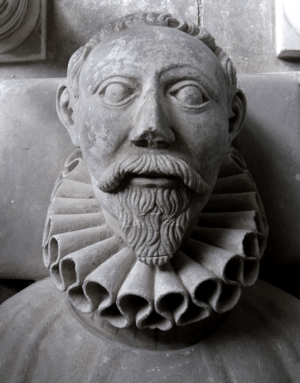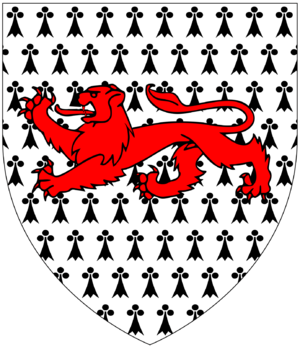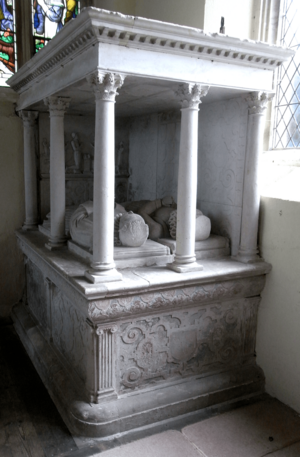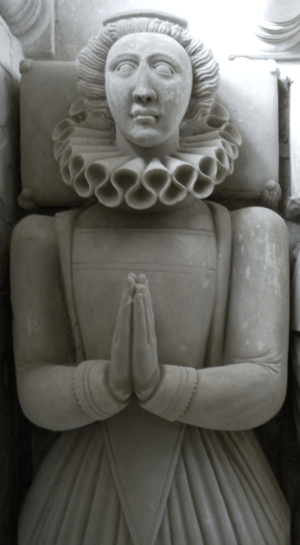Edward Drew facts for kids
Edward Drew (born around 1542, died 1598) was a very important lawyer during the time of Queen Elizabeth I. He lived in places like Killerton, Broadclyst, and The Grange, Broadhembury in Devon, England.
Edward Drew held many important jobs. He was a Serjeant-at-Law, which meant he was a top lawyer who advised the Queen. He was also a Member of Parliament, representing different towns like Lyme Regis and Exeter. Later, he became the Recorder of the City of London, a very respected legal position in the capital city.
Contents
Edward Drew's Family Background
Edward Drew was the oldest son of Thomas Drew, who was born in 1519. His mother was Eleanora Huckmore. Her family was also from Devon. Edward was likely born at his family's home called Sharpham, which was near Totnes in Devon.
His Education and Learning
Edward Drew went to Exeter College, Oxford when he was younger. Records show he was a student there in 1557. Even though he didn't finish a degree, he moved to London to study law. In November 1560, he joined the Inner Temple, which was a famous place for training lawyers. He was probably about 18 years old at the time.
Edward Drew's Career as a Lawyer
Edward Drew became a very successful lawyer. He worked a lot in both London and Devon. He quickly earned high honors in the legal world.
In 1581, he became a Master of the Bench at the Inner Temple. This was a senior position. In 1584, he became a Lent Reader, which meant he gave important lectures on law. You can still see his family crest with this date in the Inner Temple Hall.
In 1589, Edward Drew was appointed a Serjeant-at-Law. This was a very high honor for a lawyer. Two other famous lawyers from Devon, John Glanville and Thomas Harris, also became Serjeants at the same time. People used to say that Edward Drew earned more money than the other two combined because he was so good at his job! His success allowed him to buy many large estates in places like Combe Raleigh, Broadhembury, and Broadclyst in Devon.
His Work in Parliament and as a Recorder
Edward Drew was elected as a Member of Parliament for Lyme Regis in 1584. He then represented Exeter twice, in 1586 and 1588.
In 1592, he became the Recorder of Exeter, a key legal role for that city. Later that year, he took over from the famous lawyer Edward Coke as the Recorder of the City of London. This was a very important and respected job. He also became a Member of Parliament for the City of London.
In 1593, he gave an important speech to Queen Elizabeth I. This happened when he introduced the new Lord Mayor, Sir Cuthbert Buckell, to the Queen for her approval.
Edward Drew left his role as Recorder in 1594. He was then appointed as a Justice for legal cases in Essex and Kent. The City of London thanked him for his loyal service by giving him a valuable silver gift.
Later Life and Family
In 1596, Edward Drew became the Queen's Serjeant. This meant he was one of the Queen's chief legal advisors. He often helped the Queen's special council, the Privy Council, with legal matters and examining prisoners.
The historian Tristram Risdon, who wrote about Devon, said that Edward Drew was "generally loved" because of his knowledge and good advice.
Edward Drew died suddenly on April 22, 1598. It is thought he caught a sudden illness while working on a legal circuit. He signed his will just before he passed away.
Edward Drew sold his family's old home at Sharpham. He then built a new, grand house at Killerton in Broadclyst. He lived there and was buried in the local church, St John's. There is a large monument there, built in 1622, to remember him and his wife.
Marriage and Children
Edward Drew married Bridget FitzWilliam, who was from Mablethorpe in Lincolnshire. They had four sons and three daughters, and all of them were still alive when he died.
One of his sons was Thomas Drew (died 1651). He was the oldest son and inherited his father's estates. Thomas was knighted by King Charles I. He moved the family's main home from Killerton to The Grange in Broadhembury. This house remained the family's home for a long time.
Images for kids
 | Dorothy Vaughan |
 | Charles Henry Turner |
 | Hildrus Poindexter |
 | Henry Cecil McBay |






